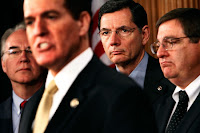
It's true that health care reform passed, bringing about the most tremendous sweeping change in national domestic policy in a generation...and some people are pissed. Now that in itself isn't anything new. Political discourse has reached the point to which we distrust politicians and expect the process to be debased and inherently flawed. I'm not bashing emotional appeals, but they should impact real issues. We should be able to clearly see the substance behind an argument. Hence, I've taken some time to better familiarize myself with the two sides of the debate. First, I looked into why a large majority is angered by this bill.
Opponents to the bill suggest that preventing insurance companies from denying coverage means policies will have to spread their investment further, making
rates rise and reducing access. The Virginia Attorney General claimed that the proposed Health Care Reform violates the 9th and 10th amendment to the constitution. The reality is the the constitution is vague in this matter, and for the constitution to apply on this (and other matters) requires judicial interpretation (Randy calls this judicial construction).

Another outcry against health care reform is that it is against the will of the people. This argument hits the heart of a democratic society, which is ruled based upon the popularity of people. However, the reality is that there are proponents of the bill. A majority of individuals have entrusted those in place to represent our state and to represent us. Recent American history tells us that politicians are not deaf to a majority of people, especially since their popularity effects their reelection. If we can then assume that politicians votes reflect the population, then a little more than half the people are for the bill. The difficulty we face is not a government ignoring its people, but rather a will divided.
5 comments:
so- are you against or for the bill?
good question- stay tuned, I'll post that wednesday (or you can call me for the answer. I got to get you to talk to me somehow) :)
on the phone?! in your dreams! :) j/k... I'll suck it up and call you soon!
I wonder if it is realistic to think that one could conduct adequate research to find the fundamentals of why it is that our will is divided, because it most definitely is in this case and others.
what do you think those two wills are in this case Moriah?
Post a Comment